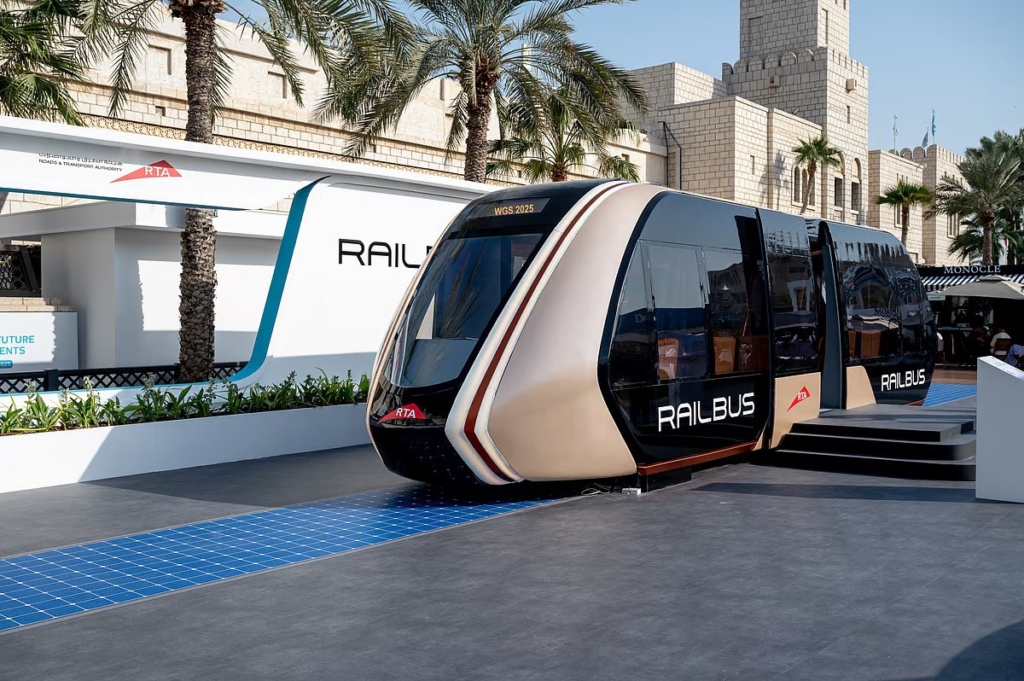The United Arab Emirates has long been known for turning visionary ideas into everyday reality — and its next chapter is all about redefining how people move. The upcoming UAE transport projects in 2025 are not just infrastructure upgrades; they represent a national leap toward innovation, sustainability, and smart living.
From driverless cars and flying taxis to the much-anticipated Hyperloop, the UAE’s transport evolution is steering the country toward a future where travel is faster, greener, and safer than ever before.
But what exactly is driving this transformation — and how will it shape daily life in Dubai, Abu Dhabi, and beyond? Let’s take a closer look.
Government Vision: Reinventing the Way the UAE Moves
Transportation is one of the UAE’s main pillars of economic growth. The government continues to implement ambitious strategies that align with UAE Vision 2030, focusing on sustainability, efficiency, and the integration of emerging technologies.
Dubai Autonomous Transportation Strategy
A key initiative under this vision is the Dubai Autonomous Transportation Strategy, which aims to make 25% of all transport in Dubai autonomous by 2030.
Imagine a city where your taxi drives itself, traffic jams are minimal, and carbon emissions drop significantly. That’s exactly what this initiative promises.
According to official projections:
- 44% reduction in transport expenses, saving around AED 900 million annually.
- 12% drop in pollution levels, leading to AED 1.5 billion in savings.
- 13% boost in productivity, equivalent to 396 million hours saved yearly.
The plan isn’t just about efficiency — it’s about creating a cleaner, safer, and smarter urban environment for residents and visitors alike.
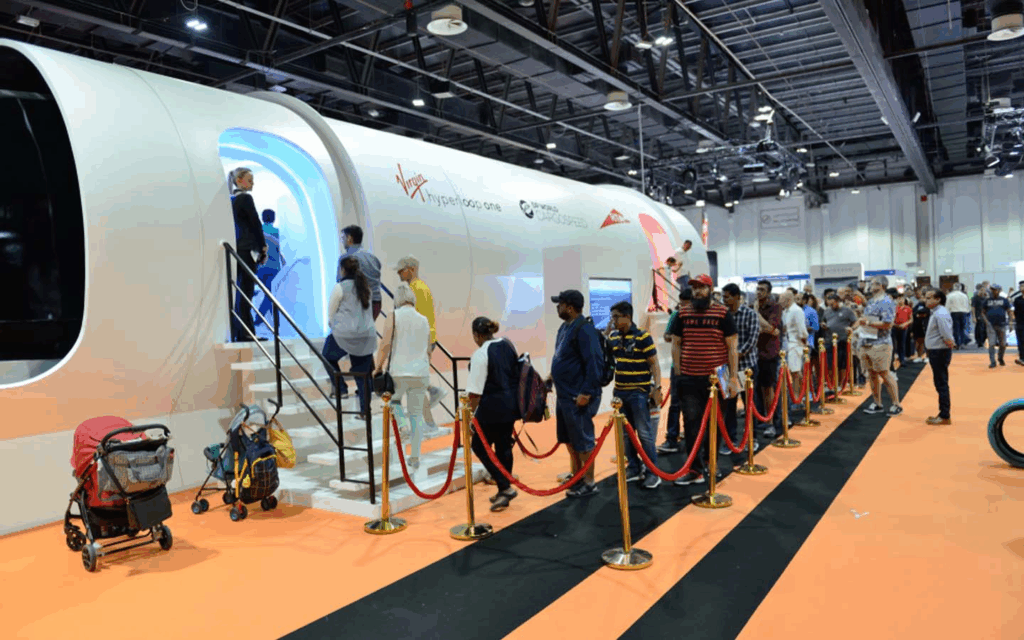

Abu Dhabi’s Surface Transport Master Plan (STMP)
Abu Dhabi’s Surface Transport Master Plan (STMP) forms the backbone of the capital’s sustainable mobility framework. The goal? To develop a balanced, multimodal transport network that supports both economic growth and environmental well-being.
This comprehensive plan emphasizes:
- Use of alternative fuels and renewable energy sources.
- Integration of Personal Rapid Transit (PRT) and solar-powered systems.
- Promotion of cycling, walking, and eco-friendly commuting.
- Reduction of carbon emissions from design to daily operations.
By 2030, the STMP will position Abu Dhabi as one of the most sustainable transport hubs in the Middle East, blending innovation with a people-first approach.
Abu Dhabi Transportation Mobility Management Strategy (TMM)
Abu Dhabi’s TMM strategy focuses on behavior — encouraging residents to shift from private vehicles to public or shared mobility options.
The plan highlights:
- Greater access to efficient public transportation.
- A reduction in traffic congestion and dependence on personal cars.
- Seamless interconnectivity between transportation networks.
In other words, Abu Dhabi is moving from car ownership to mobility as a service (MaaS) — where getting from point A to point B is effortless, affordable, and sustainable.
Major Upcoming UAE Transport Projects
Let’s explore the futuristic transport systems currently under development across the emirates.
1. Etihad Rail Network
One of the UAE’s most ambitious projects, the Etihad Rail spans 1,200 km across all seven emirates, connecting urban centers with industrial hubs and extending into the GCC network.
Once fully operational, this high-speed system will:
- Transport both freight and passengers.
- Reduce road congestion and logistics costs.
- Strengthen regional trade and tourism links.
The network is a critical part of the UAE’s long-term infrastructure plan, symbolizing unity and progress across the nation.
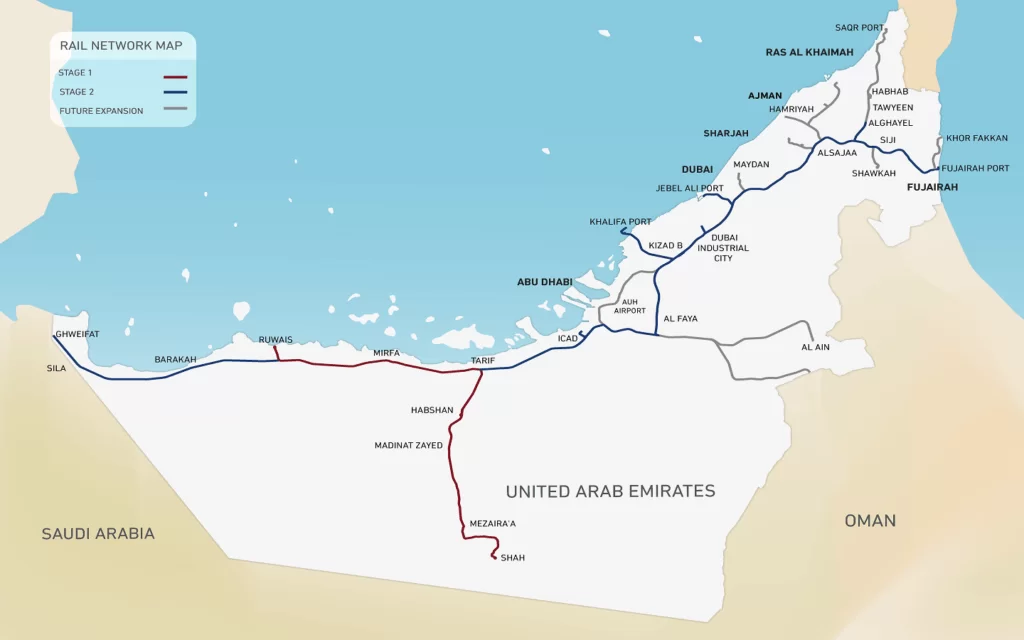

2. Dubai Metro Blue Line
Following the success of the Red and Green lines, Dubai is expanding with the Metro Blue Line — a 30 km route featuring 14 stations (five underground, nine elevated).
Running parallel to Sheikh Mohammed Bin Zayed Road (E311), it will connect major districts including:
- Dubai Creek Harbour
- International City
- Dubai Silicon Oasis
- Academic City
This line will also adhere to green building standards, offering residents and visitors a low-cost, eco-friendly commuting option.
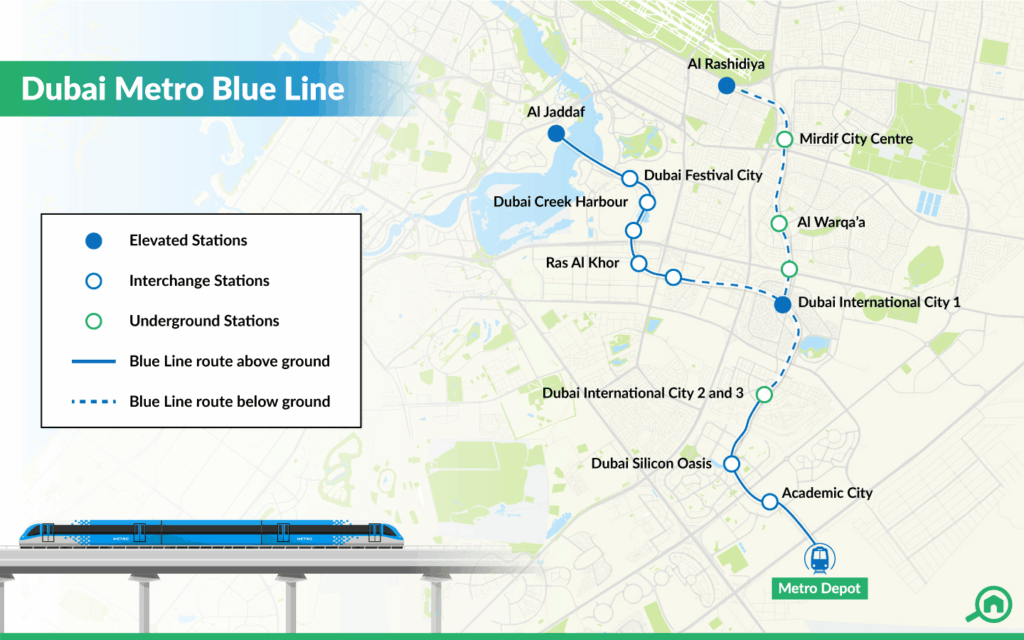

3. Floc Duo Rail: The Driverless Pod System
Unveiled at GITEX Global 2024, Dubai’s Floc Duo Rail introduces driverless electric pods capable of traveling both on the ground and in the air.
Designed by the Roads and Transport Authority (RTA), these pods aim to ease urban congestion and improve first- and last-mile connectivity.
Imagine hopping into a pod that takes you directly from your office to the nearest metro station — without a driver or traffic delay. That’s not a dream anymore.
4. Flying Taxis in Dubai
Perhaps the most exciting innovation yet, flying taxis are expected to take off by 2026. Confirmed by H.H. Sheikh Mohammed bin Rashid Al Maktoum, these electric aircraft will connect key areas like Downtown Dubai, Dubai Marina, and Dubai International Airport.
Each aircraft can carry four passengers and a pilot, reaching speeds of up to 300 km/h.
Want to know more about available properties? Our team is ready to answer your questions. Contact us now!
Contact us via WhatsAppThis project positions Dubai as a global pioneer in aerial urban mobility.
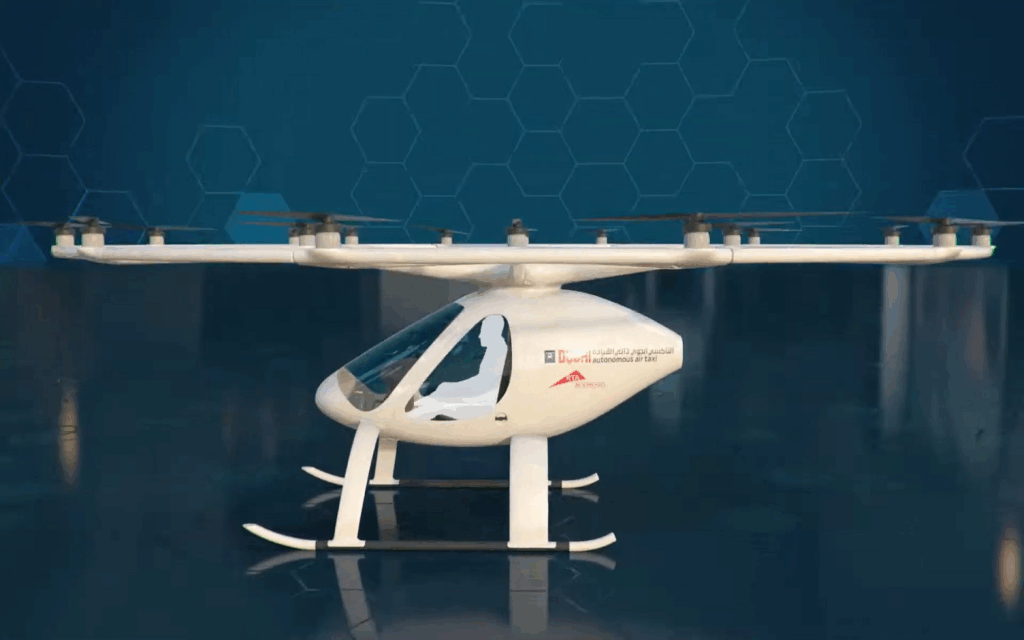

5. Autonomous Cars and Taxis
Through its collaboration with Cruise, a U.S.-based autonomous vehicle company, Dubai aims to deploy self-driving cars and taxis that align with the Dubai 2030 Smart Mobility Vision.
The benefits are clear:
- Elimination of human error — responsible for 90% of accidents.
- Improved road safety and traffic flow.
- Reduced emissions and operational costs.
By 2030, autonomous vehicles could become as common as regular cars in Dubai’s streets.
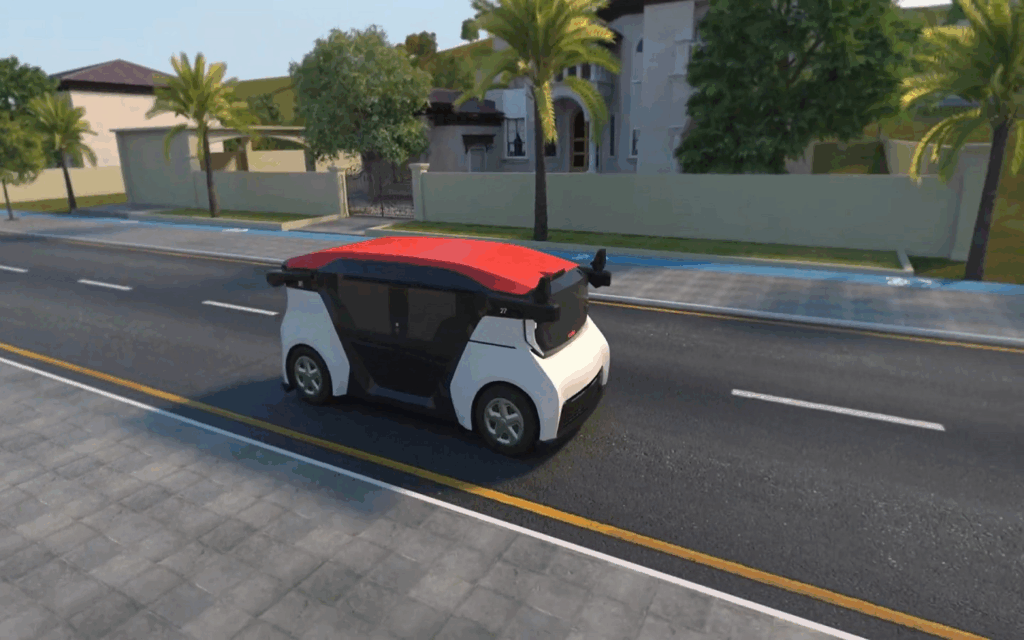

6. The Hyperloop: 12 Minutes from Dubai to Abu Dhabi
Picture this: you board a sleek pod in Dubai and arrive in Abu Dhabi in just 12 minutes. That’s the promise of the Hyperloop, a vacuum-tube high-speed transport system reaching speeds of 1,000 km/h.
This solar-powered system could carry up to 45 million passengers annually, redefining long-distance travel across the UAE.
Once completed, the Hyperloop will be one of the most transformative mobility projects in the world.
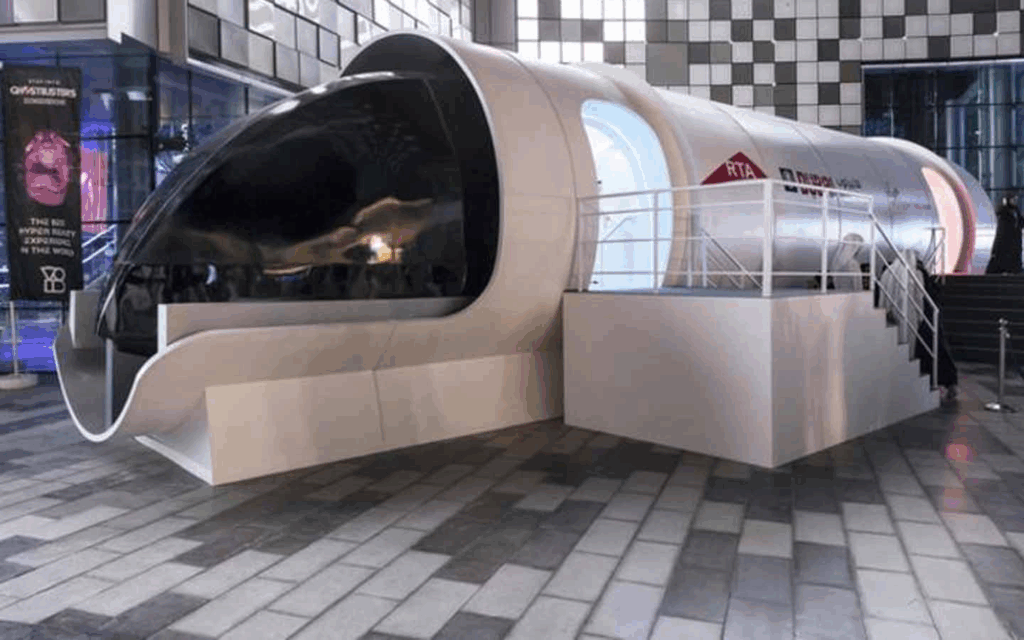

7. Electric Abra: Sustainable Water Transport
Dubai’s iconic abras — traditional wooden boats — are getting a high-tech makeover. The Electric Abra, produced using 3D printing technology, can carry 20 passengers while operating entirely on electric power.
This project reinforces Dubai’s commitment to green mobility, reducing carbon emissions and preserving its cultural heritage.
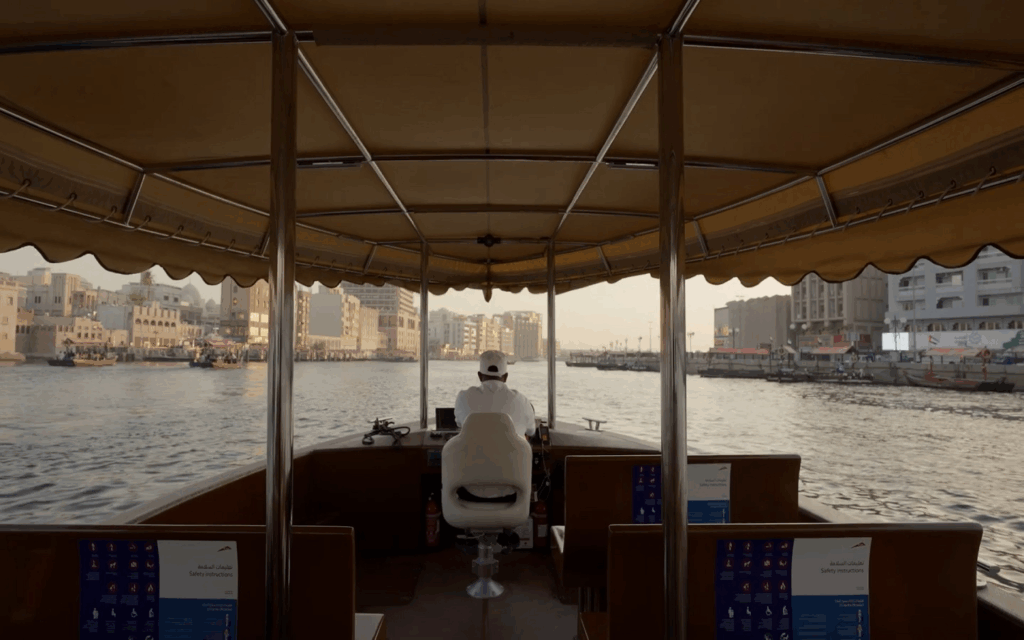

8. Sky Pods: Urban Mobility in the Air
Dubai’s Sky Pods are futuristic cable-car-style systems designed to glide above city traffic. Each pod can travel up to 150 km/h and is five times more energy-efficient than standard electric vehicles.
They’ll link areas like Umm Suqeim Street, Al Khor, and Zabeel, forming a vital part of Dubai’s Smart Mobility Strategy.
Similarly, Sharjah is developing its own version, which will also handle cargo transportation at speeds of up to 100 km/h.
9. Dubai Loop: A Glimpse into Next-Gen Travel
Among the newest additions to the UAE’s transport innovation portfolio is the Dubai Loop, a 17-kilometre pilot project targeting completion by Q2 2026.
With speeds of up to 100 mph, the Loop will accommodate 100,000 passengers per hour, aligning perfectly with Dubai’s sustainability and smart city goals.
10. Trackless Tram System
RTA’s trackless tram project marks another first for the region. Designed to accommodate 300 passengers, these trams will operate on smart navigation technology, running smoothly through city streets without physical tracks.
Top speed? 70 km/h.
Environmental impact? Minimal.
Convenience? Maximum.
It’s a clever mix of bus flexibility and tram efficiency.
Beyond Dubai and Abu Dhabi: Nationwide Innovation
Transport innovation isn’t limited to major cities. Ras Al Khaimah (RAK) has partnered with Joby Aviation to launch electric air taxis by 2027, coinciding with the opening of Wynn Al Marjan Island.
This project will operate on demand, offering seamless connectivity between RAK and the rest of the UAE.
FAQs About Upcoming UAE Transport Projects
When will driverless taxis launch in Dubai?
The RTA hasn’t confirmed an exact launch date, but ongoing trials indicate we could see autonomous taxis on Dubai’s streets in the near future.
Are these projects government-led or private sector collaborations?
While the UAE government spearheads most initiatives, private partnerships play a vital role — ensuring innovation, investment, and long-term sustainability.
The UAE at the Forefront of Global Mobility
As the UAE accelerates toward a smarter, cleaner, and more efficient future, its transportation vision serves as a global benchmark.
These projects are not merely about movement; they’re about reshaping urban life, reducing environmental impact, and enhancing quality of life.
From Hyperloop tunnels to flying taxis, the UAE is not just keeping up with global trends — it’s defining them.
So, the next time you step into a driverless car or glide across Dubai Creek on an electric abra, remember — you’re not just commuting. You’re living in the future.

